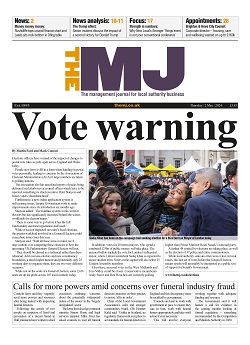Can the failure of your policy to be popular ever be just because you communicated it badly?
It may sound unlikely, but it’s the line that our new Prime Minister has been feeding us about the impact of the now infamous ‘fiscal event’ on the financial markets, the position of the Tories in the polls, and the psychological wellbeing of the Conservative Parliamentary party.
Her argument has been not only that her policies were right, but that they would have gained popular support if the comms had been done right – if the ‘pitch had been rolled’ correctly in advance.
There is a whiff of talking down to the public here. If only they thought a bit harder, they would have realised how brilliant we are with our package that we believe (despite little evidence) will produce 2.5% growth very quickly and so help everyone be better off.
And of course, there is something in the argument that comms, stakeholder management and the like do matter.
Councils know you do have to roll the pitch to get certain policies through and to have some degree of support. If you want to argue – when allowed by the Government – for a chunky rise in local council tax, you can't just land it on an unsuspecting public, especially when family finances are so stretched. You need to explain why you might need to put it up, what you would do with the money, how you are going to support those who can't afford it. You will probably blame a few others for the need to raise it – central government not giving you enough money, inflation eroding your income, an urgent need to prop up social care. None of this is likely to mean the punters will be out there celebrating wildly when you announce the increase, but at least you will have some understanding from them. And not to do any of the prep work almost guarantees that it will land badly.
In the years running up to the Labour government's increase in National Insurance contributions in 2002 there was a great deal of work to get the public ready for it and in the right place. The increase was linked to a popular purpose, funding the NHS. In particular, there was a review by an independent person (Derek Wanless) that made the case for more spending on the NHS. Remarkably this meant that putting up this tax had majority support from followers of all the major parties including 54% of Conservative voters (according to an opinion poll at the time) – a rare thing in our politics where people are often said to want Scandinavian public services on American tax rates.
A whole series of focus groups and opinion polls help you to understand where the public are, what they will accept, and what the best narrative is to keep them on board. All this takes time but needs to be done.
In addition, you always need to work to make sure your colleagues, the key ones, are sighted on the policy change and are on side. If your senior colleagues are unsure, or worse, start to say publicly that they don’t agree, then you are in trouble – as Liz Truss and Kwasi Kwarteng found out with the mini-Budget – and especially its abolishing of the 45p top rate of tax – without consulting or even informing Cabinet colleagues in advance. It is no surprise that the 45p rate remains intact.
So yes, comms matters and to ignore it is foolish. But it can't perform miracles. If the policy is fundamentally poor, or does not chime with where the public are, then in the end you will be found out however good your PR onslaught. That is something that perhaps our Prime Minister has now learned. Has the lesson come too late?
Dan Corry is chief executive of NPC – a think-tank and consultancy on third sector issues. He is a former Treasury and Downing Street economic adviser




